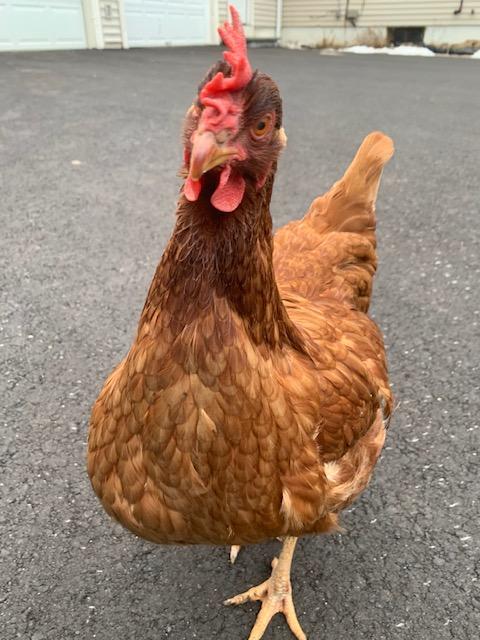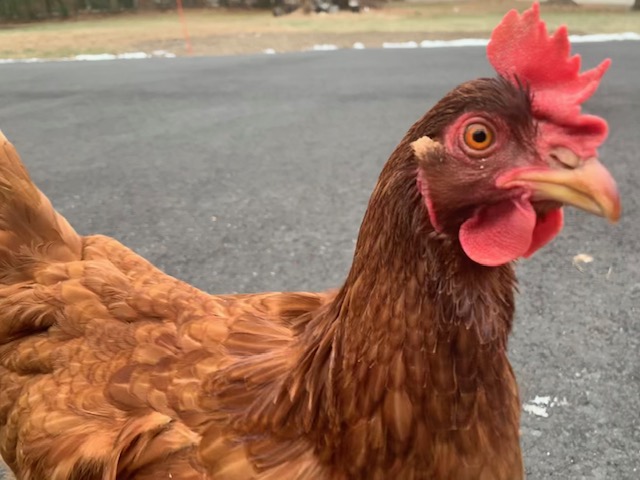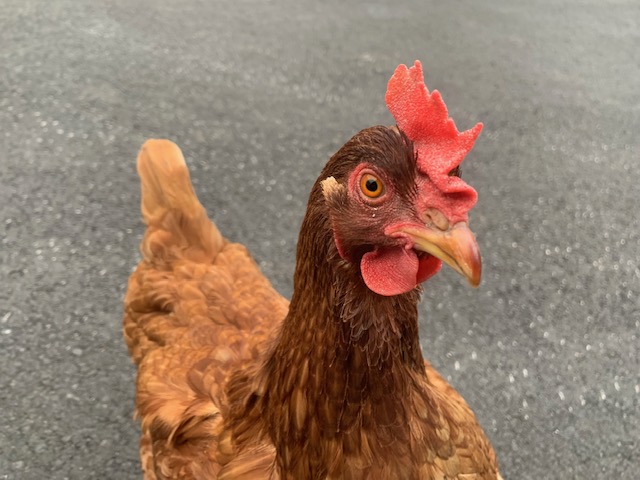otoro
Chirping
We have a flock of 4. 3 Reds and 1 Aracana. All are 9 months old. One of our hens is named Lara (because she is/was very brave even as a small chick). As we moved into winter this year she has stopped laying.
She got sick about a month ago, and symptoms matched up with coccidosis, we treated with amprolium and she got significantly better. Crop feels a little stiff, comparatively but no foul smell. (We put ACV in their water on every fill). Comb is normal color, her eyes seemed to have gotten just a tad bit darker in color, but they are 6mo old or so, so perhaps still changing? No worms in her poo. Poo looks right color and consistency.
Sorry this is a bit disorganized.
Her issue is that she seems like she's becoming more of a 'runt.' She's by far the smallest chicken, and seems to have some problems with her feathers coming in all the way during the winter moult. Especially on the bottom of her belly, around her vent, and various other areas. Looks like feathers are trying to grow but not fully developing. She is often by herself, and struggles to put on weight. She shivers often, and I caved and put a small pad heater in the coop to help keep her warm during the colder winter nights.
She has completely stopped laying, and is more lethargic than usual, but not as bad as when we treated for coccidosis. She is still eating, but not doesn't eat a lot. She is lowest on the pecking order, but is also quite a sweet little chicken. She is our most intelligent bird, and the one I have the best relationship with.
I'm hoping it's not failure to thrive, one of those less common cases where the chicken makes it to adulthoot, but struggles. Looking for any advice and suggestions on what I can try, I'm really running out of ideas on what could be going wrong.
She got sick about a month ago, and symptoms matched up with coccidosis, we treated with amprolium and she got significantly better. Crop feels a little stiff, comparatively but no foul smell. (We put ACV in their water on every fill). Comb is normal color, her eyes seemed to have gotten just a tad bit darker in color, but they are 6mo old or so, so perhaps still changing? No worms in her poo. Poo looks right color and consistency.
Sorry this is a bit disorganized.
Her issue is that she seems like she's becoming more of a 'runt.' She's by far the smallest chicken, and seems to have some problems with her feathers coming in all the way during the winter moult. Especially on the bottom of her belly, around her vent, and various other areas. Looks like feathers are trying to grow but not fully developing. She is often by herself, and struggles to put on weight. She shivers often, and I caved and put a small pad heater in the coop to help keep her warm during the colder winter nights.
She has completely stopped laying, and is more lethargic than usual, but not as bad as when we treated for coccidosis. She is still eating, but not doesn't eat a lot. She is lowest on the pecking order, but is also quite a sweet little chicken. She is our most intelligent bird, and the one I have the best relationship with.
I'm hoping it's not failure to thrive, one of those less common cases where the chicken makes it to adulthoot, but struggles. Looking for any advice and suggestions on what I can try, I'm really running out of ideas on what could be going wrong.







 Thank you for the update. Reproductive problems are unfortunately not uncommon, and it can be hard to pinpoint the definite issue until necropsy. As difficult as it was, I think you made the kindest decision for her.
Thank you for the update. Reproductive problems are unfortunately not uncommon, and it can be hard to pinpoint the definite issue until necropsy. As difficult as it was, I think you made the kindest decision for her.